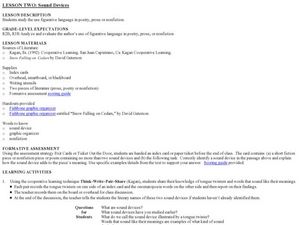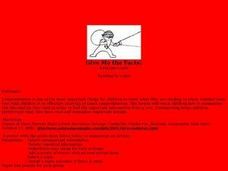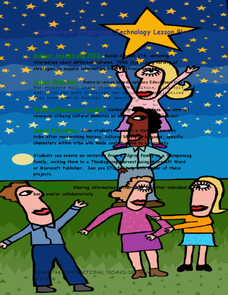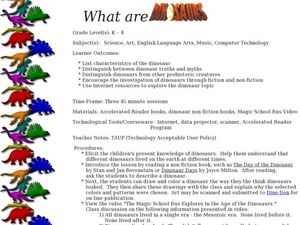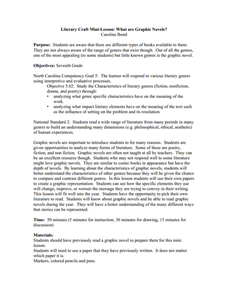Curated OER
Sound Devices
Young scholars examine the impact of sound devices in poetry, prose, and non-fiction. In this figurative language lesson, students read instructor-selected literature and identify uses of alliteration, repetition, consonance, rhythm,...
Curated OER
Give Me the Facts!
Young scholars study how to summarize a reading passage to improve their comprehension. They read a non-fiction passage and use five steps to summarize it while working in groups of three. Next, as class, they decide which group provided...
Curated OER
Autobiography
Sixth graders read and write autobiographical sketches, determine the author's purpose in writing, and type paragraphs using WP utilities.
National Center for Case Study Teaching in Science
A Strange Fish Indeed
Communication is one of the most important aspects of science. In a two-day activity, your high school or college-level biologists will read excerpts from a fictional diary of Marjorie Courtenay-Latimer, the woman who discovered the...
Curated OER
A River Ran Wild: An Environmental History
The Nashua River serves as the focal point of an investigation of the treatment of and care for natural resources. A reading of A River Rand Wild: An Environmental History by Lynne Cherry, launches the study and class members consider...
Curated OER
Jurassic Park: The Science and Ethics of Genetic Engineering
Explore genetic engineering through an engaging "Jurassic Park" unit, which is an extensive use of a cross-curricular teaching event. Planned for AP Biology, English, and Calculus students, learners and teachers are involved for 4-6...
Curated OER
Keep It Short!
Students examine the process of summarizing text. They participate in a class discussion, and read an assigned passage from their textbook, highlighting the main points of the text. Students then write a short summary of their...
Curated OER
Parts of a Story
Students read a short fiction book and demostrate comprehension by identifying the main characters, setting, conflict, theme, and summarizing the main points. They organize the information in Inspiration and create a powerpoint to show...
Curated OER
Native Americans
First graders explore the lifestyles of several North American tribes. They investigate about the homes, food, transportation, and daily living habits of each tribe. Pupils use a map to locate several Native American tribes in North...
Curated OER
From Fact to Fiction: The Origins of Constellations
Sixth graders investigate the constellations. In this constellations lesson, 6th graders discover where the constellations are located and the myth associated with them. Students create their own myth and make a slide show about stars...
Curated OER
What are Dinosaurs?
Students explore the attributes of dinosaurs. For this dinosaur lesson, students read books and watch videos featuring dinosaurs. Students also research dinosaur traits using Internet sources.
Curated OER
Minty
Students investigate, read, and discuss about other famous Afro-American leaders. Students compare/contrast slaves home, activities, etc. with that of Afro- Americans today. Students create a time line to post on the wall of Harriet's...
Curated OER
Author In The Spotlight
Complete an in-depth study of the works or a specific author. Working in pairs, young scholars read at least four works by the same author. After completing the reading, they create an essay comparing and contrasting the works and create...
Appalachian State University
What Are Graphic Novels?
To do this engaging and pleasurable activity, your learners should have already read a graphic novel, and produced a piece of writing that can be reproduced into the format of a graphic novel. This exercise provides a script that...
Curated OER
I am Special and You are Special Too - Project Children L.E.A.D.
Eighth graders recognize what makes them special through class participation and discussion of rap music, writing a poem about themselves, and designing their own special hat while working in groups.
Curated OER
Carnavals and Colonialization
Ninth graders compare and contrast different Carnavals throughout Latin America. In this Latin American lesson, 9th graders study the geography and colonial history of Latin America.
Curated OER
The Reasons For The Seasons
Students investigate the different seasons that occur and how the weather is characterized according to the regions of The United States. They conduct research using the internet and then conduct classroom discussion while considering...
Curated OER
The Life And Times Of The Apple
Learners engage in a study about the biology of apples that includes growth and reproduction. They conduct research using a variety of resources. Students write a description of an apple brought to class by answering several questions....
Curated OER
Imagination Or Observation?
Read the books, "Frog and Toad Are Friends," and "Tale of a Tadpole," to distinguish between fantasy and reality in the books. In this reading comprehension lesson plan, students review the similarities and differences in each book with...
Curated OER
Let's Discover Communities
Second graders compare and contrast the city and the country. After reading books about animals, 2nd graders create picture cards of animals in both the country and city environment. In partners, students draw pictures of animals,...
Curated OER
Hunting Through the Library
Second graders examine a library database system. They are given practical exercises to explore the database system. Finally, the student selects two books, locates the books in the library, and uses these sources for reading and research.
Curated OER
Note-Taking
Students take notes and summarize information. In this communication lesson, students summarize information by taking notes using the various methods that their instructor presents to them.
Curated OER
Putting the Truth in Writing
Students define "nonfiction" and describe what they view as the best pieces of nonfiction writing. They determine criteria to evaluate whether or not a piece of nonfiction writing is good, and list categories of nonfiction writing.
EngageNY
TASC Transition Curriculum: Workshop 12
How can opinions slant facts? Workshop participants learn how to examine primary and secondary sources and identify the author's point of view. They also examine how visual art impacts the meaning and rhetoric of sources. Full of...


